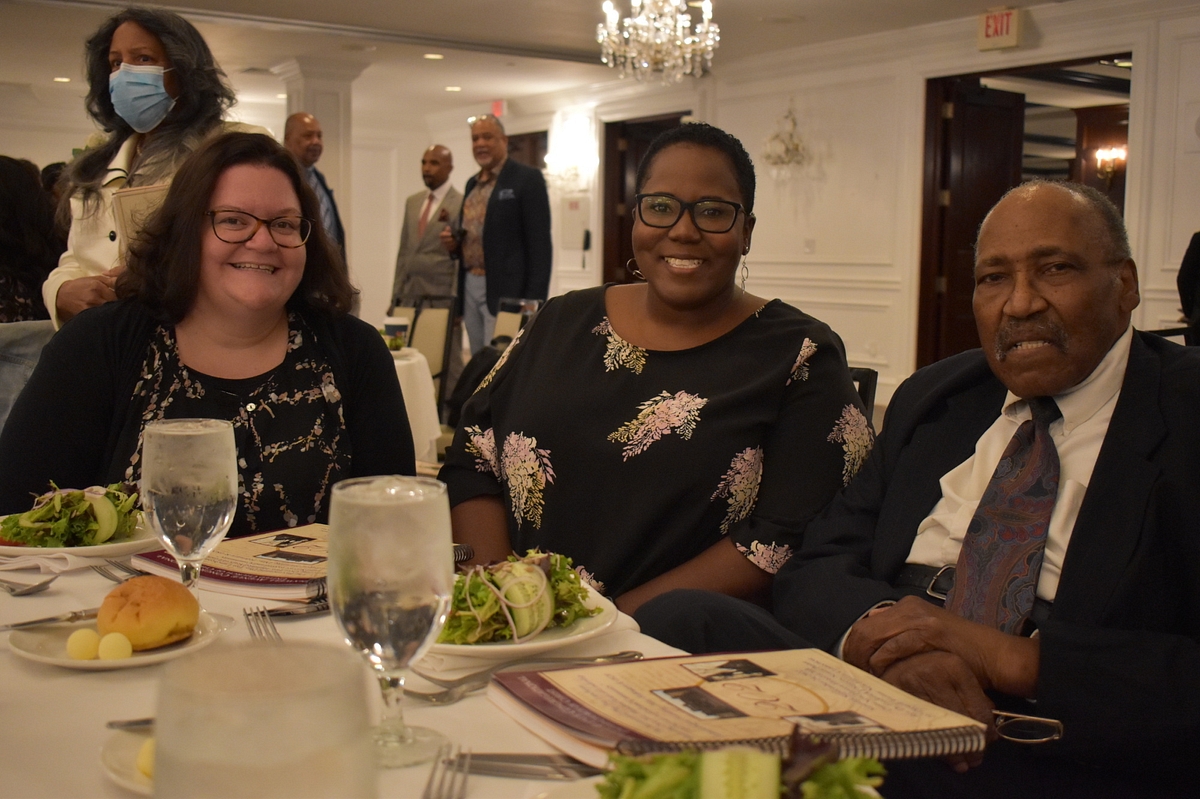
Laura Glesby Photo
Jana Russo-Priestley, center, with wife Anne and father Arius.
Jana Russo-Priestly arrived at the Omni ballroom remembering the role that Dixwell Avenue Congregational United Church of Christ (UCC) has played in three generations of her family’s history — as well as in two centuries of New Haven’s.
Russo-Priestly was one of several hundred congregants, politicians, and city-wide partners to attend the 202nd anniversary gala for one of the city’s oldest Black churches on Saturday morning at the Omni hotel on Temple Street.
The gala was initially planned in honor of the Dixwell UCC’s 200th anniversary, but it had been delayed for two years due to pandemic health precautions.
Guests found their seats beneath crystal chandeliers for the long-delayed gathering, celebrating the church’s legacy of fighting for justice, from the abolition movement to the AIDS epidemic.

Lisa and William Fluker sing "Lift Every Voice And Sing."
Russo-Priestly’s family has attended UCC since the 1940s. Congregants still tell stories about the wedding cakes her grandmother would bake, she said. Her parents got married in the church. She had her Confirmation there.
Now, Russo-Priestly is a minister herself. Dixwell “always encouraged me to stand up, speak out” on issues like LGBTQ+ rights and reproductive justice, she said. The church’s centuries-long history of progressive action lives inside of her.

Kelli Ray.
Seated a few tables away, Kelli Ray said that she first encountered UCC when the church’s senior pastor, Rev. Frederick Streets, taught her at the Yale Divinity School. “I am a nervous person,” Ray said. “Rev. Streets helped me step out of that nervousness.”
Since joining the church community as a member, Ray challenged herself to act in plays and take on leadership roles in homeless rights’ organizations. “Dixwell is so good at capturing what it means to be committed to social justice,” she said. She’s learned that “God is so much bigger.”

Rev. Frederick Streets.
At the gala, the church honored five local organizations devoted to racial and educational justice with historic ties to the church: the Amistad Committee, an organization that memorializes the Amistad rebellion; the George W. Crawford Black Bar Association, named after a UCC member; the Greater New Haven NAACP and the Greater New Haven African-American Historical Society, both of which were founded in part by UCC members; and the Q House.
Dixwell Church began in 1820 as a group of 24 congregants, nearly all of whom were Black and unwelcome at established white churches. In 1829, it became the first Black faith organization to be recognized within the historically white Congregational Church denomination. Since then, the church continued to strive, as Rev. Streets described on Saturday, for “resistance, renewal, and reform.”

State Rep. Toni Edmonds-Walker, with other state legislators Pat Dillon and Gary Winfield.
The Dixwell UCC served as a stop on the Underground Railroad for enslaved African Americans seeking refuge. Its early congregants included survivors of the Amistad slave ship, upon which enslaved Africans from Sierra Leone revolted and eventually sued for their freedom.
The church donated land for the first incarnation of the Dixwell Q House community center, which has since revived next to the church’s latest home at 217 Dixwell Ave. According to State Rep. Toni Walker, during the AIDS epidemic, the church became a makeshift classroom for children who tested positive for the highly stigmatized disease. The church has invested in local housing, substance use rehabilitation, and after-school programming.

Charlayne Hunter-Gault.
The event’s keynote speaker, international journalist Charlayne Hunter-Gault, addressed the value of turning to past resilience in an era when schools across the country are escalating restrictions on teaching Black history. “In so many schools, our history is not being taught at all,” she said.
Hunter-Gault was one of the first two Black students to integrate the University of Georgia. She fought to go to college in court with the help of her attorney at the time, Constance Baker Motley, who grew up in New Haven and who later became the first Black woman to be appointed as a federal judge. When she arrived on campus after the hard-won legal battle, Hunter-Gault faced racist riots. White protestors threw rocks at her window, she recalled, and police were slow to protect her.
Hunter-Gault said she drew strength from a past she had inherited: from her grandmother, who taught her a Bible verse each day; from her parents, who taught her to revere language and who didn’t doubt her future as a journalist; from her idols, like journalist and activist Ida B. Wells.
“We keep digging up the past in order to polish our armor,” said Hunter-Gault, in order to “make a way of no way.”


Congratulations and happy anniversary of 202 years of Dixwell Avenue Congregational United Church of Christ (UCC) supporting the community.